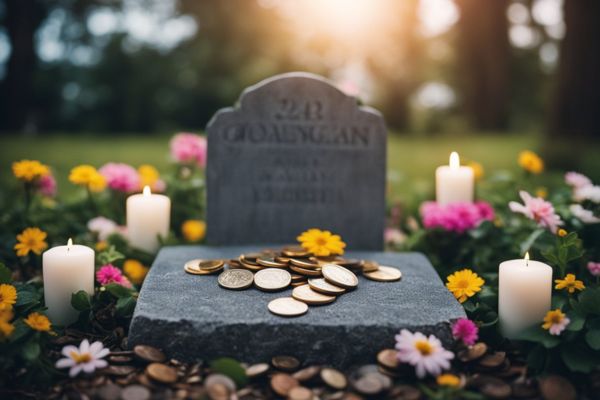Exploring Tradition and Meaning
Leaving coins on gravestones has a deep meaning that helps visitors feel connected to the person who has passed away and shows respect for their memory. When coins are placed on a military grave, it’s a way to honor and thank the service members for their sacrifices. The type of coin—like a penny, nickel, or dime—can show how close the visitor was to the person, such as whether they knew them personally.

This custom, often seen in cemeteries and war memorials, comes from different cultures and historical practices. Over the years, it has changed to include modern habits but still keeps its main goal of remembering. When people visit graves, especially those of soldiers, they leave coins not only to reflect personally but also as a silent way to tell the family that the deceased are still remembered.
Key Takeaways
- Coins on graves show respect and remembrance.
- Different types of coins mean different levels of connection.
- The tradition has roots in history and culture.
Historical Origins of Coin Placement
The tradition of putting coins on graves comes from ancient customs. These practices were often connected to beliefs about life after death and the idea of using coins as gifts or symbols related to the journey to the afterlife.
The tradition of putting coins on graves comes from ancient customs. These practices were often connected to beliefs about life after death and the idea of using coins as gifts or symbols related to the journey to the afterlife.
Greek Mythology and the Afterlife
In Greek myths, coins were very important for the trip to the underworld. When someone died, it was common to place a coin, called an obol, on or in the mouth of the dead person. This coin was meant as payment for Charon, the ferryman, who would take the soul across the River Styx to the afterlife.
This tradition shows how people wanted to make sure the dead had what they needed to reach the afterlife. Even today, some graves have coins left on them as a way to honor these old beliefs. This practice reminds us how Greek myths still shape the way people think about death and the afterlife.
Coins in Ancient Egyptian Customs
The ancient Egyptians also had rituals for the dead, but their ways were different from the Greeks. While they didn’t use coins like the Greeks did, giving offerings was still very important in their burial practices. The Egyptians believed that the journey to the afterlife was complicated and required many resources.
Things like food, valuable items, and symbolic objects were placed in tombs to help the deceased in the afterlife. Even though coins weren’t commonly used, the idea of preparing for the afterlife was similar to other ancient cultures. This shows that many ancient societies made sure the dead were ready for their journey, even if they didn’t use coins like the Greeks.
Evolution of the Tradition
The custom of placing coins on graves has a long history and carries special meanings, especially today. This tradition is commonly seen at military graves, showing respect and honoring the memory of those who have passed. Challenge coins also play an important part in this practice, adding deeper military significance.
Coins on Graves Today
In recent times, the tradition of leaving coins on graves has become more noticeable. This act is more than just a simple way to remember someone. For many, leaving a coin is a way to show respect and gratitude without disturbing the grave. Since the Vietnam War, this practice has become more popular in the United States.
Different coins can send different messages. A penny means someone visited the grave, while nickels, dimes, and quarters can show different connections to the person who died, especially if they were in the military. This small but meaningful gesture allows visitors to express their respect and connection quietly.
Military Significance and Challenge Coins
Military graves often have coins placed on them as a quiet way to show respect. For both veterans and those still serving, leaving a coin can mean showing unity, honor, or remembering time spent together in service. This tradition is especially meaningful in military cemeteries, where different coins can have different meanings.
Challenge coins also play a role here. These coins, which usually have the symbol of a military group on them, can be left as a sign of friendship and loyalty. When found on a grave, they can highlight important accomplishments or show that the person was part of a specific military group, highlighting strong ties and lasting relationships.
Cultural and Symbolic Meanings
Putting coins on gravestones has deep cultural and symbolic meanings. It’s a tradition that shows respect for the dead and offers wishes for good luck. Each type of coin has its own meaning, showing the relationship and intentions of the person who left it.
Honoring the Dead
Leaving coins on gravestones is often a way to show respect for those who have died. This custom is especially important for military members. A penny means someone visited to pay their respects. A nickel shows that the visitor trained with the deceased during boot camp, while a dime means they served together. A quarter means the visitor was there when the person died. This tradition gives people a physical way to connect with the dead and show their gratitude.
Coins also show that the person’s memory is being kept alive. By leaving a coin, people show that the deceased is not forgotten and their legacy continues.
This tradition helps people feel connected to loved ones and service members, even after they have moved on.
Coins as Symbols of Good Luck
Coins can also stand for good luck and protection for the dead in the afterlife. This idea comes from old customs where people believed coins could help carry souls to the next world. This belief turns the act of leaving coins into a way to make sure the soul travels safely and feels comforted.
In some cultures, coins are given as gifts to bring good fortune. They show hopes for wealth and happiness in the next life. Coins as signs of luck can also express the wish that the dead find peace and have an easy journey after death. This rich meaning remains important in many different communities and traditions.

Contemporary Practices
Placing coins on gravestones is both a symbolic gesture and a modern tradition with deep roots. The types of coins used and their meanings vary, allowing people to express their emotions and connections in unique ways. These tokens of remembrance are intertwined with evolving memorial customs.
Variations in Coin Types
In recent years, different coins placed on headstones have taken on distinct meanings. A penny often signifies that someone has simply visited the grave. A nickel indicates that the visitor and the deceased trained together, possibly in boot camp. Leaving a dime suggests they served together in some capacity. A quarter signals that the visitor was present when the service member passed away.
These coins allow individuals to communicate unspoken messages of respect and shared experiences. It is a subtle yet powerful way to acknowledge relationships and personal connections with those who have served. This tradition has become widespread across the United States, especially at military cemeteries, helping visitors honor the legacy of those who gave their lives for their country.
Coins and Modern Memorial Customs
Beyond individual meanings, the act of placing coins on graves has become part of broader memorial customs. This practice gained prominence during and after the Vietnam War, when public sentiment around military service was notably divided. The simple gesture of leaving coins offered a way to honor fallen soldiers while avoiding political connotations.
Many people are also incorporating this tradition into personalized memorials. Coins can be found at sites honoring veterans and, increasingly, at grave sites of ordinary people as a symbol of love and remembrance. As a welcoming and inclusive practice, it transcends cultural and historical contexts, allowing anyone to participate in this timeless act of respect.
Frequently Asked Questions
Coins left on gravestones hold various meanings, depending on the tradition and the denomination of the coins. This ancient practice often symbolizes respect and remembrance for the deceased.
Coins on military graves are used to show respect for military service. A penny indicates that someone visited, while a nickel signifies training together. Leaving a coin means a connection or acknowledgment was made with the deceased.
In Jewish tradition, stones are more commonly placed on graves. However, if coins are left, it can symbolize the continuation of memory and prayers for the deceased.
Leaving a dime on a gravestone signifies that both the visitor and the deceased served together in some capacity. This coin represents shared military service or a close bond, marking a special connection between them.
Coins left at cemetery gates can symbolize an offering or a toll for the soul’s journey. This practice may reflect more modern interpretations or spontaneous gestures of respect.
Removing coins from a gravestone can be considered disrespectful. Coins are left to honor the deceased, and taking them might disrupt this sign of respect and remembrance for their service or life.
Table of Contents
Headstones & Markers is proudly powered by WordPress